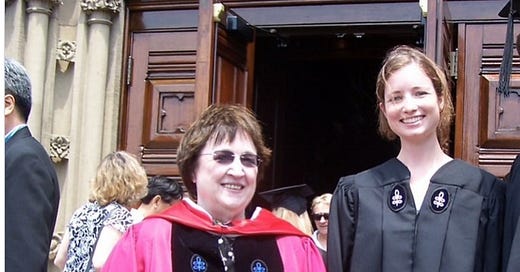Yesterday we learned that Helen Vendler had passed away at the age of ninety. As everyone has pointed out, she was brilliant, respected, rigorous. She was also so, so kind to me when I was a senior in college—a public-school kid from Tennessee who’d been writing poetry for about five semesters and reading it seriously for fewer—and in the years afterwards when I was figuring out what to do with my life. It’s ridiculous even to point out that her example as a critic is daunting—but so, too, is her example as a kind and devoted teacher. Now, a poet and poetry teacher myself, I wanted to write a little about the kind of exemplar she was and is.
I did not know Professor Vendler well, and even though she began signing her emails to me “Helen V” after college, and then “Helen,” I still cannot call her by her first name. I took her seminar on John Keats in the fall of 2006, and I remember two things about it. The first was, of course, her pedagogy. Professor Vendler asked for a lot—for deep engagement and sustained writing, for a lot of reading, all of primary texts. She gave so much in return: handwritten comments on every assignment, no matter how small, meticulous attention to grammar and writing. I am still scared of em-dashes, remembering her corrections on a sentence in which I overused them. She took her students seriously as thinkers and readers. If you offered something about a poem she had never thought of before, she would say so—and make you feel how much it meant to her, that you’d given something new.
This depth of feeling runs throughout all her criticism, and if my books were not in my office while I am on leave, here is where I’d provide some examples of the compassion in which almost all of her readings of poems are grounded. As an example, then: the second thing I remember about her Keats seminar is her version of Keats, a deeply sympathetic and human one. Her Keats was a man whose medical training had sensitized him to human suffering, who loved his brothers and the natural world—a poet, I seem to remember her saying, of the heart and hearth and the home as much as anything.
So her Keats, so her person. I went back through some old emails a few days ago. In one of them, she thanks me for having been willing to do some bibliographic work for her Yeats book when she was swamped; the press will handle it, she says, but she can still offer work if I need it. “A friend in need,” she says, “is a friend indeed.” In one, she tells me (imagine!) that she has enjoyed reading my notes—probably slightly unhinged missives from an isolated year teaching English in a small French town, reading Proust, etc.—and that perhaps we should ditch formal papers and just exchange emails with our students. And when I needed a recommendation letter delivered “in person” to some Harvard office during that year abroad and told her I would figure out a way to make this happen, she offered to do it herself: “I’m a person, no?”
Her work was narrow in some ways; she was uninterested in anything she thought of as “theory,” or so she said when I floated an idea for some graduate school project or another by her. She considered lyric poetry to be a non-social form; she was invested most of all in what she called “inner life,” in private feeling. But so much poetry criticism shows off braininess, prestige, or specialized knowledge, begins in the realm of the coldly conceptual, or generates esoteric or convoluted arguments; Professor Vendler called bullshit on that (and I hope will excuse the vulgarity). Her way of reading poetry and teaching it was to do it as a human being—a very smart and demanding one, but someone whose rigor was rooted in empathy, care, and a sense of common humanity. When I think of her hand-delivering that letter, I think again of Keats (wrenching him just a little out of context, I know): “This living hand, now warm and capable / … I hold it towards you.”





Lindsay, I was hoping that someone who had studied with Helen Vendler would write a tribute to her. Thanks for stepping up. I have put off reading her last essay -- an analysis of Whitman's "The Artilleryman's Vision" -- because I know how bereft I will feel when I finish it. Instead, I looked back at her commentary on Wallace Stevens's elegy for George Santayana, "To an Old Philosopher in Rome." "At the moment of death," Vendler wrote, "it is Santayana's lifelong creation, his edifice of thought, that becomes, in Stevens's view, a final architecture of 'total grandeur at the end.'"
If you had access to your books, I wonder which examples you would choose of "the compassion in which almost all of her readings of poems are grounded." Maybe I can guess at one of them. In her chapter on Keats's "Ode to a Nightingale," she wrote: "Like Ruth, he has emerged into a strange land: his exile was to leave the mythological realm of Flora and old Pan, of spring and budding, and accede to the lapses of time -- for him usually symbolized by the passage from budding to being full-blown, and from the season of flowers to the season of fruit or corn. 'The very corn which is now so beautiful, as if it had only took to ripening yesterday, is for the market: So, why should I be delicate' (Letters, II, 129). The sad heart of Keats, sick for his proper home in leafy luxury, stood in tears amid the alien corn of his brother's reaping."